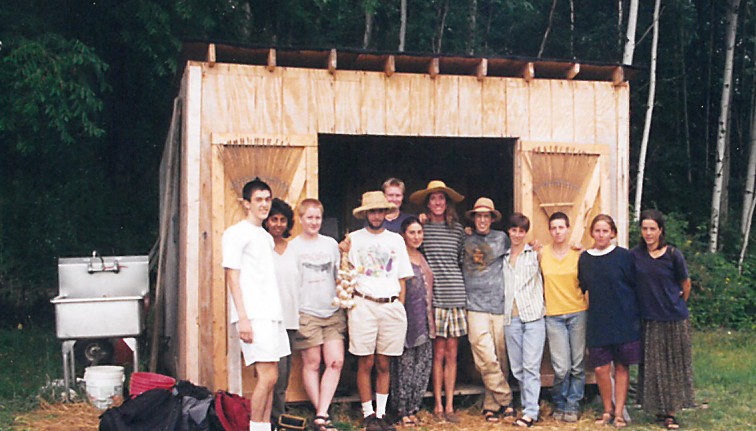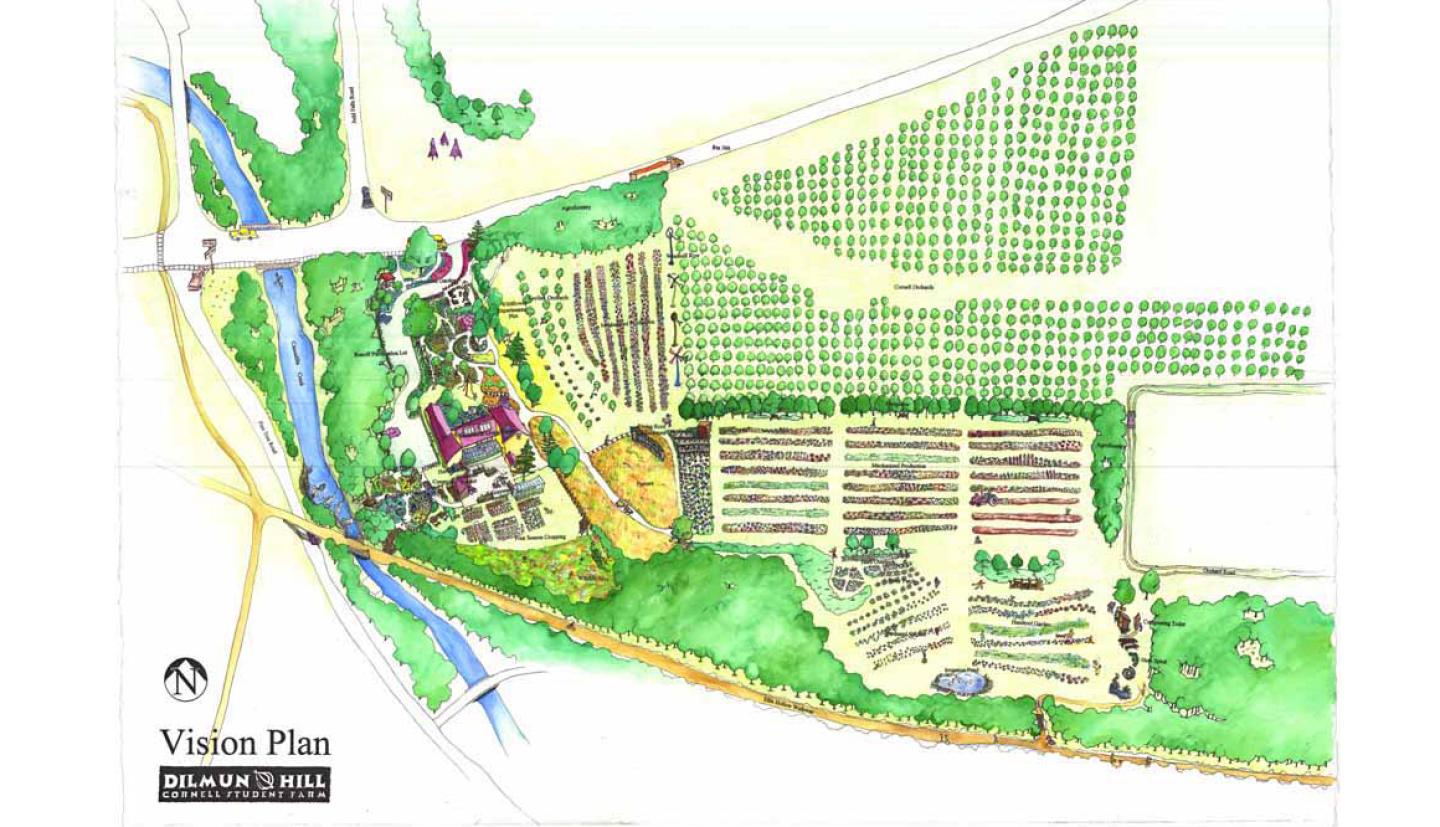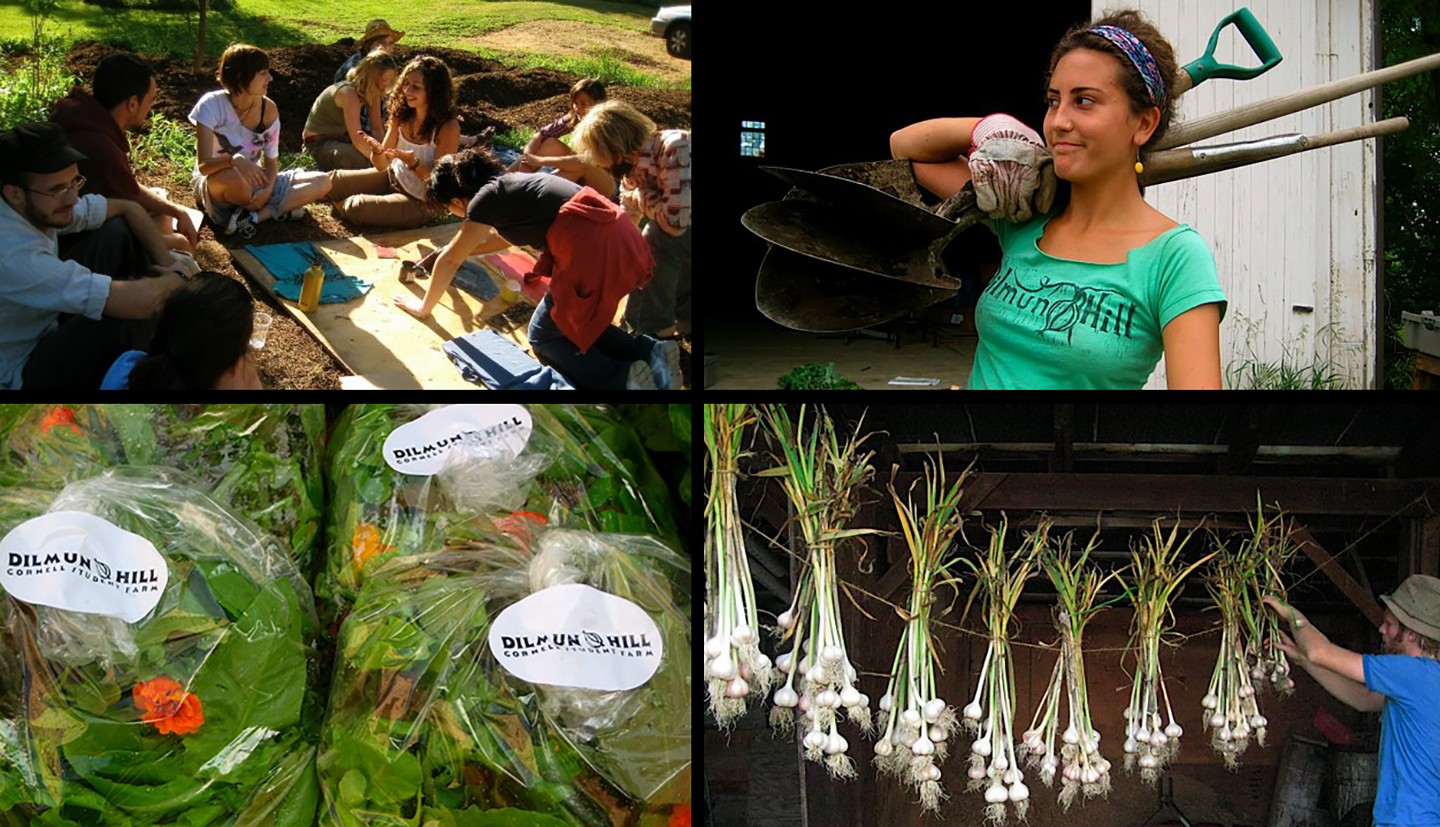Dilmun Hill History
Land Acknowledgment
Cornell University is located on the traditional homelands of the Gayogo̱hó꞉nǫɁ (the Cayuga Nation). The Gayogo̱hó꞉nǫ' are members of the Haudenosaunee Confederacy, an alliance of six sovereign Nations with a historic and contemporary presence on this land. The Confederacy precedes the establishment of Cornell University, New York state, and the United States of America. We acknowledge the painful history of Gayogo̱hó꞉nǫ' dispossession and honor the ongoing connection of Gayogo̱hó꞉nǫ' people, past and present, to these lands and waters.
How Dilmun Hill Got Its Name
A Sumerian tale describes Dilmun as the "Garden of Eden." Sumeria was located in the Persian Gulf near the mouth of the Tigris and Euphrates Rivers – "The Fertile Crescent" – where agriculture has its roots.
Photo: The new tool shed at Dilmun Hill in 1996

A Rich History
Dilmun Hill started with a simple but bold idea: a working farm where Cornell students could learn by doing. In 1994, a group of graduate students pushed for a place where they could put their classroom learning into practice and gain real, hands-on experience in sustainable agriculture. By 1996, that dream took root. Cornell Orchards set aside three acres of land, where students built beds, toolsheds and fences – and got growing. That was the farm’s first official season.
From the very beginning, Dilmun Hill was not only about agriculture, but also about leadership, collaboration and community. Students from all majors came together to plant, build and problem-solve. By 1998, the farm had expanded to include more acres and the old Blair Barn, and students were selling sweet corn and other produce at farm stands on campus.
In the early 2000s, new programs sprouted at Dilmun Hill: community supported agriculture (CSA), sheep grazing, beekeeping, vermicompost production, and wildflower, nut and berry research all became part of the growing experiment. The farm blossomed into a living classroom where Cornell courses visited for labs in soil science, agroforestry, entomology and more.
Since 2005, Cornell AES has served as the administrative and operational home to provide improved structure, continuity and support while keeping student leadership at the heart of the operation.
Over the years, the farm’s footprint grew to 12 acres, integrating a diversity of cropping systems that include vegetables, flowers and herbs, mushrooms, and fruits – all grown with organic and regenerative practices – and distributed through campus outlets, including the farm's CSA, a campus grocery and food donations. Fall classes, club activities, independent projects, and faculty-led research have all contributed to the farm’s community and educational footprint.
Today, Dilmun Hill is a vibrant hub of learning, leadership, and community where students learn to manage a working farm, and creativity and experimentation are encouraged.
History - Year by Year
The 1990s: From Vision to Student Farm
1994 – An idea is born
A group of students called the Graduate Student Sustainable Agriculture Working Group (GSSAWG) forms to improve experiential learning activities at Cornell for graduate students with a focus in sustainable agriculture and food systems. A top priority for the GSSAWG is to "establish a small scale Cornell working farm on campus and distribute produce through campus food outlets."
1995 – Plans take shape
In the fall of 1995, Professor Ian Merwin from the Department of Horticulture, and graduate student Josh Slotnick put together a grant proposal to help fund a student organic farm at Cornell. While the grant application was unsuccessful in securing funding, GSSAWG and a group of College of Agriculture and Life Sciences (CALS) undergraduates help push forward with the project.
1996 – Dilmun Hill is established
Dr. Merwin and the group successfully petition Cornell Orchards to provide three acres of land that were no longer actively used by the Orchards. Eight long planting beds are cultivated that season, and six additional beds the following year. Dilmun Hill also builds a new shed to store tools and equipment, and an electric fence to protect crops from critters. Student managers, including Marguerite Wells, the farm's first Summer Production Manager, and volunteers help with these projects. The farm is managed by the Department of Horticulture.
1998 – The farm grows
Additional land adjacent to the existing site is acquired from the Department of Animal Sciences. This new land includes the Blair Barn and nine acres of tillable ground. A large plot of sweet corn is wildly successful. Sales are expanded through farm stands at Mann Library and Collegetown. Student managers continue to work with kids at the Southside Community Center and the Greater Ithaca Activity Center to teach them about sustainable agriculture.
1999 – Developing a vision
Dilmun Hill receives a grant from an anonymous donor, which provides salaries for two full-time student summer managers. Students from several schools at Cornell – from engineers to landscape architects – collaborate to create a broad vision plan for Dilmun Hill. The plan includes many kinds of plantings, green energy sources, livestock, and a sustainable living center. Some elements of this plan are implemented, such as the planting of an agroforestry windbreak and permaculture-style fruit tree terraces.
Jump ahead:

2000-2009: Experimentation, Collaborations and Growth
2000 – Sheep, bees, and drip irrigation
Drip irrigation is installed in the plots and gardens on the hill. The farm attracts dozens of volunteers, and hosts summer programs for area youth. A growing number of Cornell classes visit the farm, including vegetable production, soil science, and agroforestry. Managers incorporate grazing sheep in their agricultural practices for two years and establish a beehive.
2001 – Sweet melons and a TV show
The plots on top of the hill are cultivated for the first time. This hot and sunny farm season produces sweet melons, which are very popular at the various farm stands on campus, along with an abundance of cut flowers and sun gold cherry tomatoes. The farm expands their farm stand presence on Ho Plaza. Dilmun Hill is featured on a cable TV garden program.
2002 – Struggling with continuity
Due to changes in staffing and help, the farm has difficulty maintaining continuity over the summer. The one full-time student farm manager does an admirable job in keeping things going, and the farm still manages to grow a large amount of produce for the Cornell community. In September the new school year brings relief with a large number of volunteers. The bees love the wildflower research project at the farm and produce lots of honey and pollen.
2003 – Community Supported Agriculture (CSA)
Dilmun's new CSA fills up quickly with 20 members, who receive their weekly share of farm-fresh produce, along with farm updates and recipes. All of the farm's produce goes to the CSA until the late July, when the farm produces enough to also continue the farm stands on campus. Bins of worms live in the basement of the barn, munching on organic waste and transforming it to vermicompost. The high-quality compost produced by this research project is used on the farm.
2004 – Tortilla Flats and Berry Terrace
The Tortilla Flats, Camel Back Bed, Market Garden, Berry Terrace, Wildflower Area and more – all integral and well-established growing areas at Dilmun Hill, are brimming with herbs, fruit, veggies, and flowers.
2005 – Dilmun Hill becomes part of Cornell AES
As part of an effort to increase operational efficiencies of agricultural operations across CALS, including research and teaching farms, responsibilities for Dilmun Hill are transferred to the Cornell University Agricultural Experiment Station (Cornell AES). The Organic Farm Coordinator starts overseeing Dilmun Hill, and functions as the main advisor and supervisor to the farm’s student managers.
2006 – Improving infrastructure
A tall deer fence is installed around seven of Dilmun's 12 acres to protect student's research projects and produce, fruit and flowers grown for sale to the Cornell community.
2008 – Agroforestry collaboration with MacDaniels Nut Grove
In addition to ongoing projects, such as the vegetable production within Dilmun's Market Garden, Dilmun Hill pursues an agroforestry collaboration with the adjacent MacDaniels Nut Grove. Shrubs and trees, like hazelnuts and maple, are interplanted with vegetables, medicinals, and berries. This helps to diversify the farm's products, and provides new opportunities for students to experiment with sustainable management methods. Melissa Madden joins Cornell AES as organic coordinator, and provides guidance and supervision to the students at Dilmun Hill.
2009 – Continued research and a growing community
Student researchers develop Best Management Practices for contaminated soil, in particular agricultural lands contaminated with lead and arsenic by pesticides used in the early 20th century - a problem quite common in the Northeast. Enthusiastic volunteers, crucial to the farm's community and success, help out for a combined 700 hours this season alone. Dilmun Hill expands collaborations with eateries on campus, in particular Manndible Café, which becomes an important customer and supportive partner.

2010 – 2019: Community, CSA and Produce Donations
2010 – Produce donations and class visits increase
Dilmun Hill continues its tradition of donating produce. This year the farm donates farm-fresh vegetables every week, a total of 400 pounds, to the local chapter of Loaves & Fishes. An increasing number of Cornell classes–six this season–visit the farm for labs, academic instruction, and hands-on learning. Teaching and outreach at Dilmun covers a variety of academic fields, including horticulture, sociology, and crop and soil sciences.
2011 – Rotary plow revolution
The tillage system at Dilmun is greatly improved by the acquisition of a rotary plow implement for the BCS walk-behind tractor, allowing great flexibility for smaller areas and the exact timing of plantings. It also works well with the farm's raised-bed system. In previous years, tillage was done by Campus Area Farms’ tractors with a moldboard plow. Betsy Leonard joins Cornell AES and serves as the staff supervisor to Dilmun Hill.
2012 – A permanent raised bed system
To combat soil compaction of Dilmun's heavy clay soils and improve overall soil health, student managers design and install a permanent raised bed system. In combination with cover cropping and mulching, raised beds also help with water management, reduce weed pressure, and are more ergonomic to work on.
2013 – A new water tower and informational kiosk
A new student-designed two-story tall water tower captures up to 500 gallons of runoff from the barn roof. After the water passes through a filtration system, it is used for irrigation of plantings around Blair Barn. A very successful crowdfunding campaign provides funds for other improvements that support Dilmun's hands-on educational mission: in particular a kiosk with informational posters near the farm entrance. New perennial gardens are installed on a very steep slope, following permaculture principles.
2014 – New fences and giant pumpkins
A student team installs a 700-foot long extension to the existing deer fence at the farm to protect the lower garden plots near the barn. This addition makes intensive farming on these superior soils possible. Dilmun's Steering Committee and Advisory Board solidify and document the governing structure to better guide daily operations and assure organizational continuity. The farm's strong history of collaborating with many other student groups such as the bee, mushroom and compost clubs, takes a new turn with Cornell Flotilla: the club successfully grows giant pumpkins at the farm that are used in the fall as vessels for a regatta on Beebe Lake.
2015 – CSA and top ranking
For the first time since 2003, Dilmun Hill is offering a Community Supported Agriculture (CSA) program. The 30 shares for the summer and the fall CSA fill up quickly. Members purchase a harvest share at the beginning of the growing season, helping the farm's cash flow. The farm not only continues to sell additional produce to Cornell eateries and at the farm stand, but also donates more than 200 lbs. to a local food assistance network. Dilmun Hill is named one of the Top 10 College Farms by College Ranker.
2016 – 20th anniversary and a new high tunnel
The farm has been growing vegetables and community for 20 years now! The new high tunnel (72’x20’), designed by former student manager Alena Hutchinson, is constructed. It sits on rails, so it can be moved between two plots to aid in crop rotation and sustainable management. The summer and fall CSAs have each grown to 45+ members.
2017 – Improved irrigation
Irrigation is extended from the adjacent Cornell Orchards to Dilmun Hill, greatly improving water access. In addition to the land at Dilmun, students farm a plot at East Ithaca with productive sandy soils. Dilmun Hill collaborates with Anabel’s Grocery, a new student run store on campus, to offer farm produce to students and host educational workshops on food and farming related topics.
2018 – New walk-in cooler
An 8’x12’ walk-in cooler is added to the barn, making harvest time more flexible and improving produce storage. Production at the East Ithaca plot continues and builds on last year’s field prep and the managers’ experiences. Students continue to sell produce to the campus community at the Cornell Farmers’ Market, through Anabel’s Grocery, and through the thriving CSA.
2019 – Building community
As in past years, the farm’s four student managers hold regular volunteer workdays, providing an opportunity for many students to get involved and build community around food and farming. The construction of a much-needed new operations barn, supported by a generous donation from Ellen and Michael Wolfson, is progressing rapidly.

2020 – 2025: Growth, Resilience and Renewal
2020 – Food donations during COVID and a new barn
Dilmun Hill has a productive season, despite remaining closed until mid-July due to COVID restrictions, and then operating with a skeleton crew of just three student managers, and no volunteers. During this challenging year the farm donates its entire harvest to the Cornell Food Pantry. In July the new barn, located on top of the hill, is ready for operation! It provides functional farm workspaces, and a lovely, covered deck.
2021 – More produce donations and raised beds
As campus COVID restrictions remain, Dilmun Hill provides an important alternative to indoor meeting locations for small student groups. The farm is excited to start serving as a host farm for the Lund Fellows Program for Regenerative Agriculture and welcomes its first fellow to the manager team. Students continue to grow crops for donations, a total of 570 lbs. They also construct frames for five raised beds with local locust lumber.
2022 – Collaborations re-emerge
As student volunteers return to the farm after the years of COVID restrictions, so does Dilmun’s popular CSA. Student managers continue their close partnership with Anabel’s Grocery. In addition to supplying the student-run store with farm-fresh produce, Dilmun and Anabel’s jointly organize social and educational student events. New faculty and student-led research in the circular bionutrient economy begins on the farm with the construction of an additional high tunnel.
2023 – Regenerative farming practices
Students are excited to add diversity to their farming systems and expand the pollinator garden with perennial flowers and integrate cut flowers into the crop mix. There’s a renewed focus on farm safety. Student managers actively share their experiences in a series of engaging short videos and other fun social media posts. Ryan Maher joins Cornell AES as the Organic Farm Coordinator and becomes the new Dilmun Hill staff manager.
2024 – Cultivating produce and community
Ten Cornell classes visit Dilmun Hill for hands-on lessons that put their academic knowledge to work. Dilmun students distribute almost 300 CSA shares throughout the summer, each including a selection of the 105 vegetable varieties grown on the farm. Among the many events at the farm this year are the expansion of a spring festival into the 1st annual Hill Day, bi-weekly potlucks throughout the summer, and the annual fall harvest festival with over 250 attendees.
2025 – Integrating agroforestry crops
Log-grown shiitake mushrooms debut at Dilmun Hill with logs inoculated the previous year producing over 100lbs from May to October. Students plant over 40 honeyberry bushes to add another specialty berry crop and pawpaws have renewed focus after reviving the hillside orchard originally planted in 1998. The farm extends outreach with workshops on pawpaw pruning and grafting in collaboration with Cornell faculty and a local grower and offer a fall field day featuring agroforestry crops.
Dilmun Hill Farm Reports
Annual farm reports:
- 2024 farm report
- 2023 farm report
- 2018 farm report
- 2017 farm report
- 2016 farm report
- 2015 farm report
- 2014 farm report
- 2013 farm report
- 2012 farm report
- 2011 farm report
- 2010 farm report
- 2009 farm report
- 2008 farm report
Dilmun Hill project reports:
- 2008 Permaculture & Agroforestry
- 2009 Permaculture & Agroforestry
- 2010 Permaculture & Agroforestry
- 2011 Permaculture & Agroforestry
- 2012 Permaculture & Agroforestry
- 2013 Permaculture Report
- 2009 BMP for Contaminated Soil
- 2010 BMP for Contaminated Soil
- 2011-12 BMP for Contaminated Soil
- 2010 Berry Production Guide

